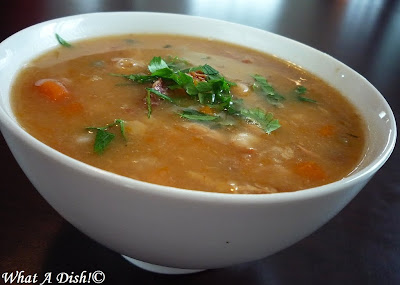
Powered by the ESHA Research Database © 2018, ESHA Research, Inc. If you are following a special diet for medical reasons, be sure to consult with your primary care provider or a registered dietitian to better understand your personal nutrition needs. Or skip the meat and make a vegetarian soup instead. Stir in the garlic and cook until fragrant, about 30 seconds. Cook until the vegetables are starting to soften. Once the oil is shimmering, add the carrots, celery, and onions. (-) Information is not currently available for this nutrient. If you dont have leftover ham, you could use leftover turkey or chicken (rotisserie chicken works, too). Place a large heavy pot or Dutch oven over medium heat. Next add the remaining ingredients and 7-8 cups of water. Season with black pepper and red pepper flakes and cook for 5 minutes. Dont worry if you dont have enough ham just use whatever you. Cover cook 85-90 minutes or until beans are tender. When hot add the olive oil and saut the vegetables. Pour in a can of undrained cannellini beans (or Great Northern Beans) and 2 cups of diced ham. Cook over medium-high heat 8-10 minutes or until mixture comes to a boil. 1 ham bone 5 large carrots, chopped 3 stalks celery, chopped 1 large onion, chopped 1 (14. (For example, it’s recommended that people following a heart-healthy diet eat less sodium on a daily basis compared to those following a standard diet.) Add ham shank, water, chicken broth, onion, celery, garlic and bay leaf. Depending on your calorie needs or if you have a health condition, you may need more or less of particular nutrients. Add the ham and ham bone or ham hock to the beans, along with onion, carrot, celery, bay leaf, and pepper. Remove the beans from heat, cover, and let stand for 1 hour. Per the Food and Drug Administration (FDA), the daily value is based on a standard 2,000 calorie diet. Bring the water and beans to a boil in a large saucepan or Dutch oven boil for 2 minutes. Percent Daily Value (%DV) found on nutrition labels tells you how much a serving of a particular food or recipe contributes to each of those total recommended amounts.

* Daily Values (DVs) are the recommended amounts of nutrients to consume each day. Nutrition information is calculated by a registered dietitian using an ingredient database but should be considered an estimate.


 0 kommentar(er)
0 kommentar(er)
